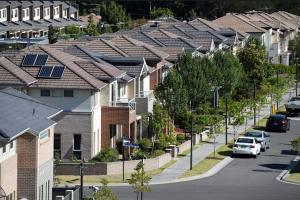The days of double digit housing growth has come to an end. Auction clearance rates for Sydney are falling below 50 percent. It is now clear that the heat in the housing market is coming off. Even if you are not a property investor, it is important to know whether this weakness will affect the overall economy. If it affects the economy, then it could potentially have an effect on your other investments. Therefore, is there a relationship between housing values and the economy? Here we explain the correlation and the different ways it can impact the economy.
Consumer Spending
There is a direct correlation between the housing market and consumer spending. Consumer spending levels will then have an affect on the economy.
When house values go up homeowners feel more confident about their financial situation. They use the equity in their homes to take out loans to spend money on renovations or on goods and services. People might also buy new furnishings and appliances to place in their newly purchased homes.
When housing values go down, consumers lose confidence and curb their spending. In a falling housing market, homeowners may find their property being valued less than their mortgage. This means that they cannot extract equity from their homes. Home owners are more likely to pay off their loan when their property value declines, rather than spend it on consumer goods.
When house prices go up households tend to save less and spend more on consumer goods. When house prices have fallen, household have saved more and there is a slowdown in consumer spending which can mean less GDP growth. For Australian retailers this could lead to conditions which will be challenging with consumers.
Decreases in Employment
Construction of new homes creates a lot of jobs as there is a vast amount of labour involved in building a home. Figures of new home developments have recently decreased. Oversupply fears have been confirmed with existing homes sitting vacant as landlords struggle to find tenants.
Uniquely combining both Fundamental and Technical Analysis
Not yet a subscriber? Join now for FREE!
Receive our weekly tips and strategies into your inbox each week.
BONUS: Sign up now to download our 21 page Trading Guide.
Purchases of old homes also contribute to the economy as it requires services from real estate agents, solicitors, and surveyors. So, a slowdown in the housing sector will affect those employed in the housing sector.
Decreases in job and employment numbers can mean a reduction of consumer discretionary spending. This is because people will prioritise spending on basic needs if they are unemployed.
Decreases in Building Construction
Purchases of new housing contributes to the country’s GDP as new housing construction will involve demand for new materials. A housing downturn may mean less housing construction. This will then decrease the demand for raw materials for building. This will impact these companies supplying raw materials and the country’s GDP.
Other Effects of Falling House Prices
1. Interest rates
The tightening of credit has been a trigger for the house price falls. Interest rates hikes will be unlikely when house prices are falling.
2. Inflation
Higher housing prices may cause higher inflation if the economy is operating at full capacity. However, Australia has not been operating at full capacity and we have had low wage growth for a while. With interest rates predicted to be on hold due to falling housing prices, inflation looks to remain below target.
Lauren Hua is a private client adviser at Fairmont Equities.
Sign up to our newsletter. It comes out every week and its free! You can leave your email with us via the form on the right-hand side of this page.
Otherwise you can email us at mail@fairmontequities.com
Disclaimer: The information in this article is general advice only. Read our full disclaimer HERE.
Like this article? Share it now on Facebook and Twitter!

